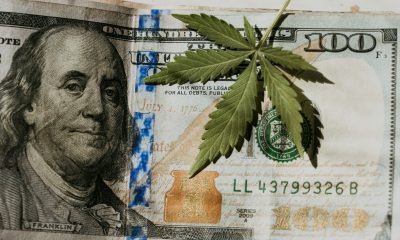Featured
Here’s the economic and financial impact of a war with North Korea
No matter how big or small, a war would immediately affect financial markets.

What’s going on between North Korea and the U.S.—the former repeatedly testing missiles and nuclear bombs and the latter not standing for it—is no work of fiction.
There’s no hero, and our chances of getting out of the situation without some sort of armed conflict are getting smaller by the day. It didn’t have to be this way.
A quick history
North Korea used to be a nice place. OK, that might be overstating it but it used to be a lot better.
Until the early 1980s, they had food, basic services, and a standard of living exceeding that of their South Korean brethren. Ronald Reagan took all that away. He didn’t do it through negotiation or force. Instead, he leaned on their benefactor.
After World War II, the Americans and Russians each controlled part of the Korean peninsula. They bickered over setting up a government for the entire country but eventually settled for two governments, much like in Germany.
The Russians installed Kim Jong-Un’s grandfather, Kim Il-Sung, as the supreme leader of the North, while the Americans established a kind-of, sort-of democracy in the South.
The North invaded in the South, but, backed by the Americans, the South fought back and conquered much of the North…until the Chinese got involved. The Middle Kingdom helped push the South back, creating a nice buffer between itself and the American-backed forces.
Over the next 35 years, the U.S. guided South Korea on its path to becoming a manufacturing powerhouse, while the North simply took aid funds from any country that hated the U.S., essentially China and Russia.
But Reagan’s gambit to bankrupt the Russians ruined that system of patronage. Eventually, the U.S.S.R. (does anyone even remember that acronym?) broke into pieces, and the central government told countries like North Korea and Cuba that they were on their own.
Meanwhile, China decided that selling stuff to Americans was a lot more fun than berating them in propaganda films while their population subsisted on what they could farm by hand.
At that point, then-North Korean dictator Kim Jong-Il needed to find a new way to generate cash. He counterfeited American dollars, sold illicit drugs, and basically ran a black market bazaar.
But that only goes so far.
Eventually, he pursued nuclear power and missiles and used his progress to blackmail aid from the West.
That sort of made sense. He needed funds and apparently couldn’t run a business the size of McDonald’s, much less a country. So he stole and robbed. It doesn’t win you a Nobel Peace Prize, but it’s a living.
Unfortunately for the world, his son didn’t get the memo.
Today’s North Korea
The recent iteration of Kim Jong has created better rockets and nuclear weapons. So far, he’s demanded that U.S. forces leave the peninsula and stated that North Korea intends to be a player on the nuclear weapon stage. His few allies keep backing away. They love the idea of poking the sleeping American dog, but this goes too far.
The more Jong-Un postures and provokes, the more anxious everyone becomes.
Will he rain fire on Guam? Target a city in Japan? Aim for some place in Alaska? Can we allow him to try, or should we act preemptively?
Either way—if he launches something at a populated area or we choose to disarm him before he causes great harm – it looks like there will be an armed conflict.
I can only hope, if anything, it involves remote outposts with few people. This will truly be a war of provocation, with no reasonable objectives, started by a crazy man. The question is, “Who gets involved?”

A war against North Korea is looming on the horizon but nations hope talks could dispel tensions. (Source)
Possible outcomes
The South Koreans don’t want a war with their relatives, but they’re the most likely target. The Japanese can’t abide by a North Korea that shoots missiles over their heads.
The Chinese don’t want North Korea to implode, leading to a refugee crisis that ends with South Koreans and Americans on their border.
The best outcome appears to be a reunified Korea, with the express agreement that U.S. troops remain at or south of the current border, the 38th parallel. That’s easy to say, and hard to do.
Germany showed how difficult reunification can be, even if ultimately successful. But the really hard part is getting to that point. First, we need Kim Jong-Un and his group to go gently into that good night.
I don’t think they will, which gets us back to an armed conflict.
What a war does to the markets
With the major U.S. indices at record highs, it seems likely that investors of all sizes would take the opportunity to lock in profits and park their cash in something safe if there’s an impending war.
This would mean a mass exodus from equities, with everyone trying to squeeze through the door of the U.S. Treasury markets.
The size of the move—in both equities and bonds—would depend on the shape of the conflict. If things look like they will be contained to conventional weapons, perhaps the financial swings aren’t as great. Defensive stocks and energy move higher, but growth names take a hit. I still believe interest rates would fall.
If there’s any hint of nuclear weapons, the move would most likely be severe and immediate. Investors will sell stocks with abandon, building up cash positions and buying U.S. government bonds. The idea will be to hunker down and see what happens.
The Japanese and South Korean equity markets will free fall, and chances are their currencies would also implode. If those countries suffered severe physical damage, the rebuilding process would require rapidly expanding the money supply. The Bank of Japan has done this for almost two decades, but the new pace would be off the charts.
With Seoul, South Korea, less than 35 miles from the North Korean border, chances are that city would be devastated, taking much of the value of South Korea with it.
As an investor, it’s hard to position yourself for such a thing
Do you buy a bunch of put options on equities and buy bonds before everyone else drives up prices? That’s a great strategy, unless the war doesn’t happen, or is so fast that markets barely react.
The better approach is to create a plan, mapping out what you will do if such a thing occurs. Make it one that limits losses, or, better yet, gives you a chance to make money in response to market-moving scenarios like this.
If you work with a financial professional, ask him or her what they will do, to make sure you agree. If you handle your own finances, create some guidelines.
Perhaps you already have stop-losses in place. If so, revisit them to verify they reflect your current views. And know what you will do with a lot of cash (which can be an awesome friend) if you suddenly sell many positions at once.
Bonds sound good on the face of it, but if rates fall dramatically, with the U.S. Treasury 10-year bond moving from 2.2% down to, say, 1.5% or lower, do you really want to own bonds?
At that rate, they don’t pay very much, and if a conflict brought rates down, then the end of a conflict should drive them higher.
It would be painful to sell equities and pile into bonds, only to get whipsawed.
The upshot is that there is no easy way to play the scenarios created by a crazy man who seems to have little regard for human life. Despite the heated rhetoric back and forth, history tells us that a diplomatic solution will carry the day.
But prudence tells us to plan for the low probability, high impact event. So spend some time considering your alternatives before things get out of hand.
—
DISCLAIMER: This article expresses my own ideas and opinions. Any information I have shared are from sources that I believe to be reliable and accurate. I did not receive any financial compensation in writing this post, nor do I own any shares in any company I’ve mentioned. I encourage any reader to do their own diligent research first before making any investment decisions.

-

 Crypto2 weeks ago
Crypto2 weeks agoBitcoin Steady Near $68K as ETF Outflows and Institutional Moves Shape Crypto Markets
-

 Business6 days ago
Business6 days agoDow Jones Stalls Near Record Highs as Inflation-Fueled Rally Awaits Next Move
-

 Fintech3 days ago
Fintech3 days agoFirst Regulated Blockchain Stock Trade Launches in the United States
-

 Africa2 weeks ago
Africa2 weeks agoAir Algérie Expands African Partnerships


























You must be logged in to post a comment Login